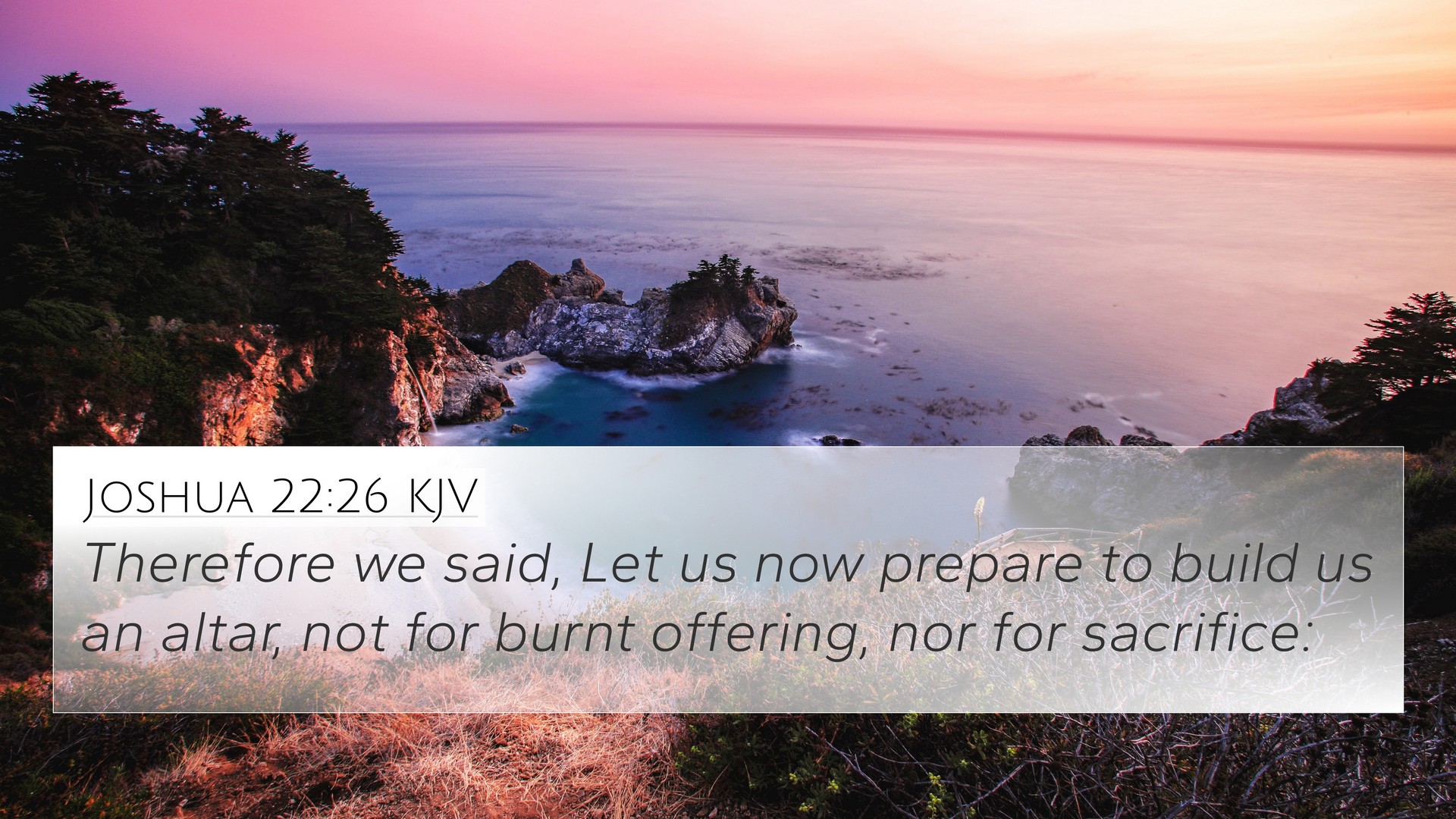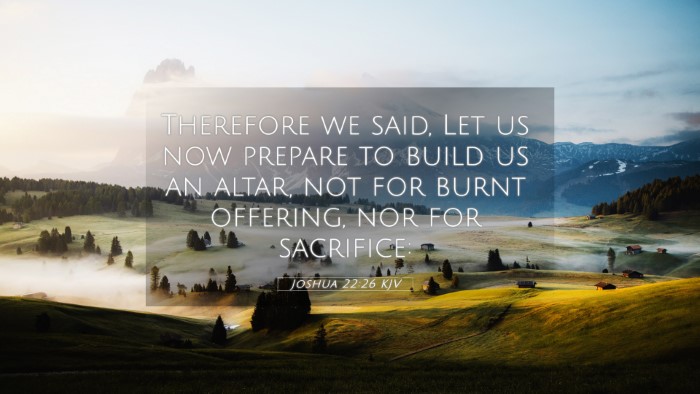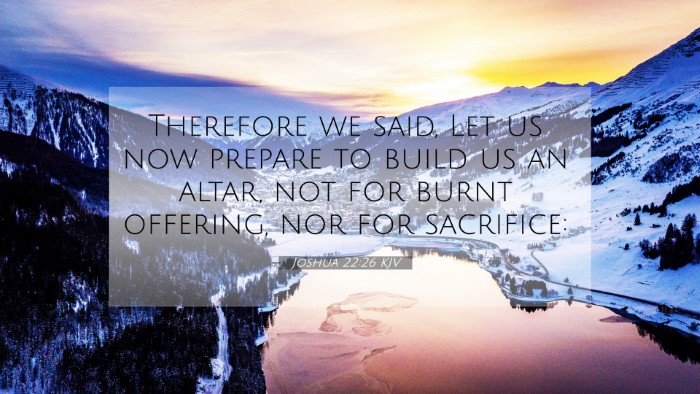Understanding Joshua 22:26
Verse: "Therefore we said, 'Let us now prepare to build ourselves an altar, not for burnt offering nor for sacrifice'" (Joshua 22:26).
This verse comes from a significant narrative in the Book of Joshua where the tribes of Reuben, Gad, and the half-tribe of Manasseh explain their intentions for building an altar. The heartfelt desire of these tribes is to establish their identity and maintain their connection to the God of Israel, despite settling on the other side of the Jordan River.
Commentary Insights
-
Matthew Henry: Henry emphasizes the importance of unity among the tribes of Israel and how the building of the altar was interpreted by the other tribes as a potential rebellion against the Lord. He highlights the careful communication necessary to avoid misunderstandings that could lead to discord among God's people.
-
Albert Barnes: Barnes discusses the nature of the altar, affirming that it was not meant for sacrifices but to serve as a witness of the tribes’ dedication to God. He points out that the altar symbolizes a desire for unity among the Israelites and serves as a reminder of their shared faith and heritage.
-
Adam Clarke: Clarke underscores the need for explanation and clarification in the face of possible misconceptions regarding the tribes' actions. He reflects on the significance of the altar in maintaining their national identity and collective worship towards Yahweh.
Meaning and Theme
In Joshua 22:26, we glean vital themes of unity, identity, and communication. The tribes are eager to ensure that their actions do not lead to division, demonstrating their commitment to God's covenant. Their intention to build an altar signifies a longing to preserve their worship and devotion, representing a bridge of faith rather than a divide.
Bible Verse Cross-References
To fully appreciate the significance of Joshua 22:26, we can explore several pertinent cross-references:
- Deuteronomy 12:5-6: Instructions on worship and how altars are to be dedicated to the Lord.
- Joshua 22:10: The initial act of building the altar and the reactions it provoked.
- 1 Chronicles 29:22: Reflects on corporate worship and the significance of unified voices in praise.
- Psalms 133:1: Highlights the blessings that come from unity among brethren.
- 2 Corinthians 6:16: Discusses the concept of the temple of God and the agreement among believers.
- Ephesians 4:3-6: Encourages unity in the bond of peace, vital for the church and its members.
- Hebrews 10:24-25: The importance of assembling together to spur one another towards love and good deeds.
Connections Between Bible Verses
The verse in Joshua has profound implications for our understanding of community worship in light of other scriptures. It acts as a reminder that our individual expressions of faith must continually point back to the collective worship of God's people. Here we see thematic connections between this narrative and the principles established throughout the Bible:
- Faith and Action: The need for communities to act cohesively reflects the teachings of the New Testament about the body of Christ.
- The Role of Altar: Altar-building underlines God’s desire for His people to remember their covenant relationship.
- Divine Communication: The necessity of clear communication mirrors the principles of conflict resolution highlighted in Matthew 18:15-17.
Tools for Bible Cross-Referencing
For deeper exploration of the themes and connections found in Joshua 22:26, consider using various tools for bible cross-referencing:
- Bible Concordance: A valuable resource to find specific verses and their occurrences throughout the Bible.
- Bible Cross-Reference Guide: Helps in identifying relationships between key themes across different books.
- Comprehensive Bible Cross-Reference Materials: A collection of verse links that can enhance personal study.
- Bible Chain References: A method for following thematic ideas throughout the scripture.
How to Use Bible Cross-References
Understanding how to utilize cross-references effectively can enhance your study of the Bible:
- Identifying Connections: Look for common themes or characters between scriptures to build a holistic understanding.
- Comparative Bible Verse Analysis: Examine similarities and differences to gain insights into God’s consistent character and divine plans.
- Cross-Referencing Bible Study Methods: Use thematic categories or keywords to structure your study sessions effectively.
Conclusion
In conclusion, Joshua 22:26 serves as a vital reminder of the importance of unity and identity in the faith community. It highlights the power of clear communication in maintaining relationships among believers. The exploration of cross-references opens up a larger dialogue within the Bible, ensuring that we understand the interconnectedness of scripture. As we navigate the complexities of our spiritual journey, may we seek to uphold the principles found in this verse and foster unity among God's people.
Further Study
For those wishing to delve deeper into how this verse interacts with various themes and principles of faith, consider exploring other scripture locations that reflect on community worship, identity, and God’s covenant, such as:
- Exodus 20:24 - Instructions on building altars.
- Malachi 1:14 - The reverence due to God in offerings.
- Acts 2:42 - The early church's devotion to teaching, fellowship, and breaking of bread.


